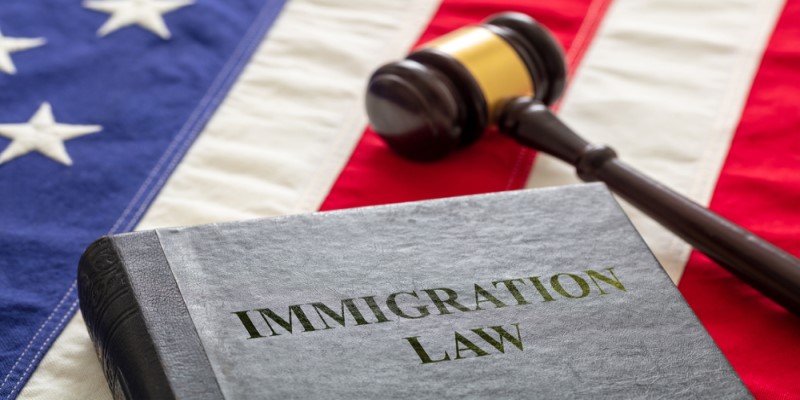
By Anayat Durrani
A bipartisan group of representatives led by Reps. María Elvira Salazar (R-FL) and Veronica Escobar (D-TX) has introduced an updated version of the Dignity Act (H.R. 3599) to fix what they call the nation’s fractured immigration system. The authors of the bill call it the first serious bipartisan immigration solution proposed by Congress in more than a decade.
“Our broken immigration system is frustrating Americans, causing people to suffer, and fracturing our country — economically, morally, socially, and politically. A solution is long overdue,” Rep. Salazar said in a statement.
The bill has four core principles: (1) ending illegal immigration; (2) providing a solution for undocumented immigrants residing in the U.S.; (3) bolstering the U.S. workforce and economy; and (4) ensuring the nation stays prosperous and competitive going forward.
The Dignity Act seeks to restore law and order to the immigration system and support U.S. workers. Among other aims of the bill, it seeks to solve critical labor shortages across industries and address longstanding backlogs and inefficiencies in the legal immigration process, to give employers the ability to fill job vacancies that remain open.
How might the dignity bill affect the EB-5 program?
Of the issues the bill seeks to address, experts say those listed under “Division E: Unleashing American Prosperity and Competitiveness” can potentially have the most opportunity for impact on the EB-5 program.
For example, in order to bring prosperity and competitiveness to the U.S. the bill seeks to cut the legal immigration backlog at ten years, so those who have been waiting for a legal visa for ten years or more, calculated by priority date, will get that visa.
“Division E has the most opportunity for EB-5 impact because of a 10 year cap on visa backlogs, a huge increase in the number of visas which can be used and also an exemption for immediate relatives,” says Greg Sheehan, director of EB-5 Investment Platform and USCIS Compliance, Behring Co. “This would be a sea of change across many categories.”
The bill would also increase high-skilled employment visa opportunities by only counting the principal applicant and excluding children and spouses from being counted towards the annual Employment-Based visa caps. It does not raise the caps.
“Specifically, the fact that family members count against the cap devalues the program by the average family size,” says Sheehan. “If you have an average family size of three, each visa is worth less than $270k worth of foreign investment and roughly three jobs each. If only the Principal Applicant’s visa’s count, then three visas are worth $2,400,000 and 30 jobs.”
More changes the Dignity bill could bring to the EB-5 industry
In addition, the bill seeks to more than double the per-country cap set in the Immigration Act of 1990, from 7% to 15% to reduce and eventually eliminate backlogs when combined with other reforms in the bill.
“If you also double the amount of visas that can be used per country, this would ensure that EB-5 is clearly the fastest immigration benefit across the board. No more speculation on rural priority and set aside limitations,” says Sheehan.
The bill aims to ensure that children legally present in the U.S. do not age out from getting certain visas because of USCIS processing delays.
“Specifically, it guarantees they receive visas they are eligible for, even if they grow out of the age of eligibility, if processing delays by USCIS were the reason they did not receive a visa in time,” says Chad Ellsworth, partner at Fragomen.
The new legislation also proposes to establish an Immigration Agency Coordinator to monitor immigration functions at USCIS, the Department of State and the Department of Labor and authorizes some $3.5 billion to streamline processing and cut down visa and work authorization backlogs.
“The United States needs to maximize this great foreign investment program especially now when economic policy challenges domestic growth,” says Sheehan.
The Dignity Act bill, Sheehan says, can “create more confidence in the government’s ability to administer the program with financial and technological improvements, we could see a production infusion without the administrative delays that come from fee proposals.”
Original cosponsors of the bill include Reps. Jenniffer Gonzalez-Colon (R-PR), Hillary Scholten (D-MI), Lori Chavez-DeRemer (R-OR), Kathy Manning (D-NC), Mike Lawler (R-NY), and Adriano Espaillat (D-NY).
DISCLAIMER: The views expressed in this article are solely the views of the author and do not necessarily represent the views of the publisher, its employees. or its affiliates. The information found on this website is intended to be general information; it is not legal or financial advice. Specific legal or financial advice can only be given by a licensed professional with full knowledge of all the facts and circumstances of your particular situation. You should seek consultation with legal, immigration, and financial experts prior to participating in the EB-5 program Posting a question on this website does not create an attorney-client relationship. All questions you post will be available to the public; do not include confidential information in your question.








